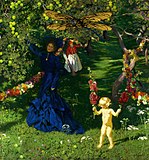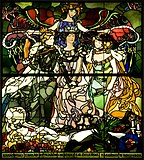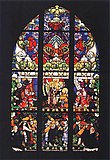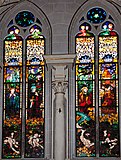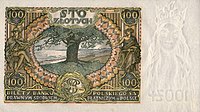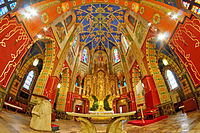Józef Mehoffer
Józef Mehoffer | |
|---|---|
 Self-portrait (1897), National Museum, Kraków | |
| Born | Józef Edler von Mehoffer 19 March 1869 |
| Died | 8 July 1946 (aged 77) Wadowice, Poland |
| Nationality | Polish |
| Known for | Painting, drawing |
| Notable work | Strange Garden (1902-1903), Portrait of Wife (1904) |
| Movement | Art Nouveau, Young Poland |
| Awards | Order of Polonia Restituta, Wawrzyn Akademicki |
Józef Mehoffer (19 March 1869 – 8 July 1946) was a Polish painter and decorative artist, one of the leading artists of the Young Poland movement and one of the most revered Polish artists of his time.[1]
Life
[edit]
Mehoffer was born in Ropczyce, studied painting at the Academy of Fine Arts in Kraków under Władysław Łuszczkiewicz, and later at the Academy of Fine Arts in Vienna, as well as in Paris at the Académie Colarossi among others. There Mehoffer began painting portraits, often of people of historical significance. He later expanded his work to include different techniques, such as graphic art, stained glass, textiles, chalk drawings, etchings and book illustrations. He produced set designs for theatre, and stylized furniture designs.
Mehoffer received international acclaim for his stained glass windows in the Gothic St Nicholas Collegiate Church in Fribourg, Switzerland produced in 1895–1936. His other stained glass designs include the Radziwill Chapel in Balice (1892), Grauer Chapel in Opava (1901), church in Jutrosin (1902), Holy Cross Chapel at Wawel (1904), sepulchral chapel in Goluchów (1906), Orgelmeister Chapel in Vienna (1910), cathedral in Włocławek (1935–1940), cathedral in Przemyśl (1940) and church in Dębniki near Kraków (1943). There are stained glass designed by Mehoffer in the Church of the Sacred Heart of Jesus in Turek; in the same church there are also mural paintings made by Mehoffer.
Mehoffer explored various media further throughout his career to include a range of applied arts in his projects. He manufactured a multiplicity of book covers, ornaments and posters. Mehoffer – aside from his versatility in studio art – became known for his frescoes often reminiscent of medieval art. He frequently collaborated with Stanisław Wyspiański and Jan Matejko. He died in Wadowice.
Gallery
[edit]-
Strange Garden (1902–1903), National Museum in Warsaw
-
Portrait of Wife (1904), National Museum in Kraków
-
Sun in May (1911)
-
Vita somnium breve, stained-glass, 1895, National Museum in Kraków
-
Interior of the Holy Cross Chapel, Wawel
-
Window of the Three Magi in Fribourg, Switzerland
-
Window of martyrs in Fribourg, Switzerland
-
100 złotych, 1934, issued by the Bank of Poland
-
Cathedral in Turek
See also
[edit]References
[edit]- ^ "One of the most revered Polish artists of his time, Mehoffer's works continue to amaze". Retrieved 21 September 2019.
External links
[edit]- 1869 births
- 1946 deaths
- 19th-century Polish painters
- 19th-century Polish male artists
- 20th-century Polish painters
- 20th-century Polish male artists
- Polish people of German descent
- Burials at Rakowicki Cemetery
- Golden Laurel of the Polish Academy of Literature
- Academy of Fine Arts Vienna alumni
- Académie Colarossi alumni
- Polish male painters
- Commanders of the Order of Polonia Restituta
- École des Beaux-Arts alumni
- Academic staff of the Jan Matejko Academy of Fine Arts
- Polish printmakers
- People from Ropczyce-Sędziszów County
- Artists from Austria-Hungary

